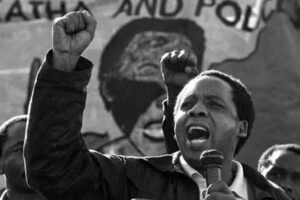Chris Hani, whose full name is Martin Thembisile Hani, is a South African politician, military commander, and revolutionary who served as the leader of the South African Communist Party (SACP). He was a chief of staff of uMkhonto we Sizwe and a strong fighter against the apartheid government.
Chris Hani’s Age
Chris Hani was born on the 28th of June, 1942, in Cofimvaba in South Africa. He was 50 years old when he died.
Early Life and Education
Chris Hani, whose real name is Martin Thembisile Hani, was born in Xhosa, Cofimvaba Transkei. He was born into the family of Gilbert Hani, a mine worker and political activist, and Mary Hani, a housewife.
Chris Hani attended Lovedale School in 1957. Following the stories he heard from his father about the ANC, he was interested in being a part of the group.
At Lovedale, Chris Hani joined the ANC and prominently influenced other students to join the group.
He studied English, Latin, and Modern and Classical Literature at the University of Fort Hare in Alice, Eastern Cape.
Chris Hani once mentioned in an interview that he was a Rhodes University graduate.
Career
Chris Hani’s career has circled politics and military service. He was a known political activist, a member of the ANC, and an army officer before his demise.
Political and Military Career
At 15, Chris Hani made his political stand by joining the ANC Youth League. As a student, he actively participated in protests against the Bantu Education Act.
Chris Hani worked as a clerk before joining the Comrade Mbeki-led party, where he learned about Marxism.
After graduating, he joined uMkhonto we Sizwe, a known armed wing of the African National Congress (ANC).
Thereafter, in 1963, Chris Hani was arrested under the Suppression of Communism Act and sent to exile in Lesotho.
As a result of his involvement in uMkhonto we Siwze, he had to go into hiding and change his first name as the South African government was in search of him.
Chris Hani received military training in the Soviet Union and served in the Zimbabwean War of Liberation and combined operations with uMkhonto we Siwze and Zimbabwe’s people’s revolutionary army.
He built his reputation as a soldier in the black army following his fight against apartheid. Due to his efforts, Chris enjoyed a lot of loyalty in some aspects as MK’s Deputy Commander.
In 1969, he co-signed with others the “Hani Memorandum,” which played a significant role in the leadership of Joe Modise and others.
This memorandum was a plea to eradicate the anti-apartheid movement in the African National Congress (ANC).
Chris Hani stressed the need for the ANC to be protected as it was at the forefront of the revolutionary struggle in South Africa.
He and the signatories to the Hani Memorandum seek to unite the party and hold its leaders accountable.
In Lesotho, Hani was responsible for organizing guerrilla operations in South Africa. By 1982, he was so prominent that he became a target for diverse assassination attempts and then moved to ANC’s headquarters in Lusaka, Zambia.
Following his position as uMkhonto we Sizwe leader, Chris Hani was responsible for suppressing muting by discovering anti-communist ANC members in various detention camps.
In 1990, after the suspension of the ANC’s ban, he returned to South Africa and succeeded Joe Slovo as the head of the South African Communist Party (SACP).
Chris Hani pushed for radical comic reform in South Africa and put great effort into advocating for a socialist economy.
In 1993, he explained in an interview the benefit of creating a socio-economic restructure that would see massive job opportunities for South Africans.
Death
Chris Hani was assassinated on the 10th of April 1993 in Dawn Park, a mixed suburb of Boksburg. He was shot by Polish far-right anti-communist immigrant Janusz Walus, who fired at him while he stepped out of his car.
Walus was arrested after Margareta Harmse, a white Afrikaner, saw him after the crime and called the police.
Following further investigation, Clive Derby-Lewis, a conservative party MP who lent Janusz Walus his pistol, was equally arrested.
A year after the assassination, democratic elections was agreed to be held on the 27th of April 1994.
Family
Chris Hani married Limpho Hani and had three children before his demise.


